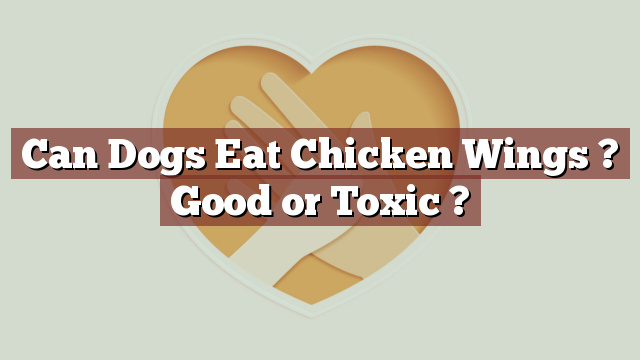Can Dogs Eat Chicken Wings? Good or Toxic?
Dogs are known for their love of food and their ability to get their paws on just about anything. However, it is important for pet owners to be aware of what foods are safe for their furry friends to consume. While some human foods can be a healthy and nutritious addition to a dog’s diet, others can be harmful and even toxic. One such food that often sparks curiosity is chicken wings. So, can dogs eat chicken wings? Let’s delve into the topic and find out.
Nutritional Value of Chicken Wings for Dogs
Chicken wings are a popular food item among humans and are often enjoyed as a flavorful snack or meal. They are a good source of protein, which is essential for a dog’s overall health and wellbeing. Protein helps in the development and maintenance of muscles, organs, and tissues. Chicken wings also contain essential amino acids, vitamins B6 and B12, iron, and zinc. These nutrients play a vital role in a dog’s immune system, energy production, and overall growth.
Can Dogs Eat Chicken Wings? Safety and Toxicity
While dogs can technically eat chicken wings, it is important to exercise caution. The main concern lies in the way the chicken wings are prepared and cooked. Seasonings, spices, and sauces used in human cooking can be harmful to dogs. Ingredients like garlic, onion, salt, and certain spices can cause digestive upset, stomach issues, or even toxic reactions in dogs. Additionally, bones found in chicken wings can pose a serious choking hazard or cause internal injuries if ingested by dogs. Therefore, it is crucial to remove the bones before offering chicken wings to your furry companion.
Potential Risks and Benefits of Feeding Chicken Wings to Dogs
Feeding chicken wings to dogs in moderation and with proper precautions can offer some benefits. The protein content in chicken wings can help support muscle development and repair in dogs. However, it is important to consider the potential risks associated with this food. As mentioned earlier, the bones in chicken wings can splinter and cause serious harm to a dog’s digestive system. Dogs may also experience digestive upset if they consume chicken wings that are heavily seasoned or cooked with unhealthy fats. Additionally, feeding chicken wings regularly can lead to obesity or weight gain in dogs due to the high fat content.
What to do if Your Dog Eats Chicken Wings
If your dog has accidentally consumed chicken wings, it is important to monitor their behavior and health closely. If your dog shows any signs of distress, such as vomiting, diarrhea, or difficulty breathing, it is crucial to seek immediate veterinary care. In cases where the bones have been ingested, a veterinarian may need to perform X-rays to determine if the bones have caused any internal damage. It is always best to consult with a veterinarian if you have any concerns or questions regarding your dog’s diet.
Conclusion: Balance and Moderation in Feeding Chicken Wings to Dogs
In conclusion, while dogs can technically eat chicken wings, it is important to exercise caution and follow certain guidelines. It is best to remove the bones and avoid seasoning or cooking methods that may be harmful to dogs. Feeding chicken wings to dogs should be done in moderation, as part of a balanced diet that is specifically formulated for their nutritional needs. As responsible pet owners, it is our duty to ensure the safety and wellbeing of our furry companions, and that includes being mindful of the foods we offer them.
Thank you for investing your time in exploring [page_title] on Can-Eat.org. Our goal is to provide readers like you with thorough and reliable information about various dietary topics. Each article, including [page_title], stems from diligent research and a passion for understanding the nuances of our food choices. We believe that knowledge is a vital step towards making informed and healthy decisions. However, while "[page_title]" sheds light on its specific topic, it's crucial to remember that everyone's body reacts differently to foods and dietary changes. What might be beneficial for one person could have different effects on another. Before you consider integrating suggestions or insights from "[page_title]" into your diet, it's always wise to consult with a nutritionist or healthcare professional. Their specialized knowledge ensures that you're making choices best suited to your individual health needs. As you navigate [page_title], be mindful of potential allergies, intolerances, or unique dietary requirements you may have. No singular article can capture the vast diversity of human health, and individualized guidance is invaluable. The content provided in [page_title] serves as a general guide. It is not, by any means, a substitute for personalized medical or nutritional advice. Your health should always be the top priority, and professional guidance is the best path forward. In your journey towards a balanced and nutritious lifestyle, we hope that [page_title] serves as a helpful stepping stone. Remember, informed decisions lead to healthier outcomes. Thank you for trusting Can-Eat.org. Continue exploring, learning, and prioritizing your health. Cheers to a well-informed and healthier future!

